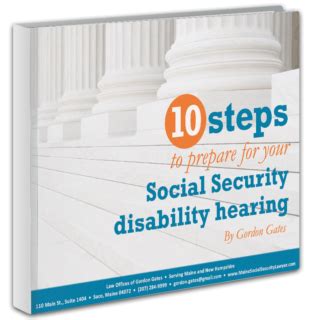The Ultimate Guide to a Successful Social Security Disability Hearing
Applying for Social Security Disability Insurance (SSDI) can be a long and arduous process. Many applicants find themselves facing a hearing before an Administrative Law Judge (ALJ) to determine their eligibility. This guide provides a comprehensive overview of what to expect, how to prepare, and strategies to increase your chances of a successful outcome. Understanding the process and proactively engaging in preparation are crucial for a positive result.
What Happens at a Social Security Disability Hearing?
The Social Security Disability hearing is a formal legal proceeding where you'll present your case to an ALJ. The ALJ will review your application, medical records, and other evidence to determine whether you meet the Social Security Administration's (SSA) definition of disability. This definition requires you to demonstrate an inability to engage in any substantial gainful activity (SGA) due to a medically determinable impairment(s) expected to last at least 12 months or result in death.
The hearing typically involves:
- Testimony from you: You'll be asked detailed questions about your medical history, daily activities, work history, and limitations. Honesty and clarity are vital.
- Presentation of evidence: Your attorney (highly recommended) will present medical records, doctor's statements, vocational expert testimony, and other supporting documentation.
- Cross-examination: The ALJ may question you, your witnesses, and the vocational expert.
- ALJ's decision: The ALJ will render a decision based on the evidence presented. This decision can be appealed if necessary.
What Evidence Should I Bring to My Social Security Disability Hearing?
Compelling evidence is the cornerstone of a successful hearing. This includes, but is not limited to:
- Detailed medical records: These should include all doctor's visits, hospital stays, test results, diagnoses, and treatment plans. Ensure your records are complete and easily understandable.
- Doctor's statements: Statements from your treating physicians specifically addressing your functional limitations are crucial. Ideally, these statements should explicitly link your medical conditions to your inability to work.
- Third-party witness testimony: Statements from family members, friends, or other individuals who can corroborate your limitations and daily challenges can significantly strengthen your case.
- Work history documentation: Pay stubs, W-2 forms, and job descriptions provide valuable context to your past work abilities and demonstrate how your current limitations prevent you from returning to your previous employment.
How Can I Prepare for My Social Security Disability Hearing?
Preparation is paramount. A well-prepared claimant is far more likely to receive a favorable outcome. This includes:
- Working with a disability attorney: An experienced SSDI attorney can navigate the complexities of the legal process, gather necessary evidence, and effectively represent you at the hearing.
- Organizing your medical records: Gather all relevant medical documents and ensure they are well-organized and easily accessible. Consider creating a chronological timeline of your medical history.
- Practicing your testimony: Review your case thoroughly and practice answering potential questions from the ALJ. Be prepared to clearly and concisely explain your limitations and how they affect your ability to work.
- Understanding the five-step sequential evaluation process: Familiarize yourself with the SSA's five-step evaluation process, which the ALJ will follow in making their decision. Understanding this process helps you anticipate the ALJ's line of questioning.
What if I Don't Have an Attorney?
While representing yourself is possible, it's strongly discouraged. The SSDI process is complex, and navigating it without legal representation significantly reduces your chances of success. Many attorneys offer free initial consultations, allowing you to discuss your case and determine if their services are right for you.
How Long Does the Social Security Disability Hearing Process Take?
The entire process, from application to hearing and beyond, can take many months or even years. The length depends on various factors, including the complexity of your case and the backlog of cases before the ALJ.
What Happens After the Social Security Disability Hearing?
After the hearing, the ALJ will issue a written decision. If the decision is unfavorable, you have the right to appeal. The appeals process involves further review by the Appeals Council and potentially the federal courts.
Can I appeal the decision if I'm denied?
Yes, if your claim is denied, you have the right to appeal. This involves a multi-step process that could potentially lead to a hearing before the Appeals Council or even federal court. An attorney specializing in Social Security Disability can guide you through this process.
This comprehensive guide provides a strong foundation for understanding and preparing for your Social Security Disability hearing. Remember, seeking professional legal counsel significantly increases your chances of a successful outcome. Thorough preparation, clear communication, and a strong presentation of evidence are key to achieving a favorable decision.

